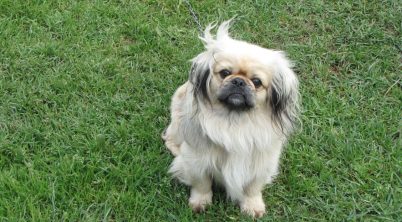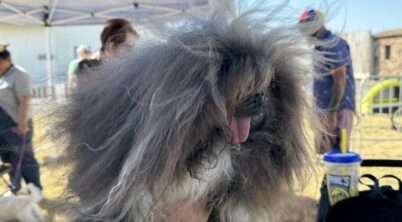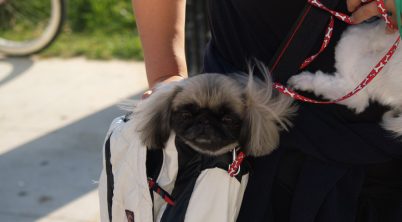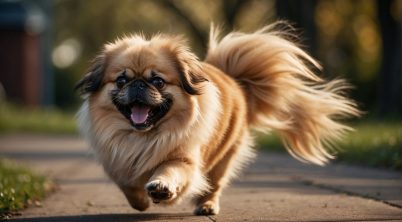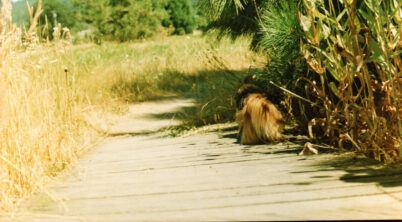Pekingese, a toy breed well-known for their lion-like mane and regal demeanor, have a specific range in terms of litter size that prospective breeders and owners should be aware of. On average, a Pekingese will have a litter consisting of approximately three puppies. However, this figure can vary based on individual circumstances and health, with some litters being as small as one puppy or as large as seven.
The litter size of Pekingese is relatively small when compared to many other breeds, which is typical for toy breeds. Factors that may influence the number of puppies include the age and health of the mother, as well as genetic factors. While these dogs are known for their independence and bold personalities, their small size and consequent small litter size mean that each Pekingese puppy can be quite a rarity and may require extra care and attention from breeders to ensure their health and well-being.
Table of Contents
Pekingese Litter Size
The Pekingese, a toy breed with a regal history, typically has a small litter size. Research indicates an average of three puppies per litter. However, these numbers can vary.
Litter Variability:
- Minimum Litter Size: Usually around one puppy
- Maximum Litter Size: Can reach up to seven puppies
The litter size is influenced by various factors including the health and age of the mother. For the Pekingese breed, it is not uncommon for births to necessitate veterinary assistance, especially in cases of larger litters.
The following represents the standard litter size data for Pekingeses:
| Litter Size | Frequency |
|---|---|
| 1 puppy | Less common |
| 2-4 puppies | Average range |
| 5-7 puppies | Less common |
Owners should be aware that while the breed can have up to seven puppies, such large litters are rare and can present complications due to the Pekingese’s small size.
Puppy Development:
During the first two weeks, Pekingese puppies are highly dependent on their mother. The entire litter requires a considerable amount of care to ensure healthy development. Given the toy size of the breed, young puppies are quite delicate and need protection from potential hazards.
Ultimately, when considering breeding or adopting Pekingese puppies, prospective owners or breeders should prepare for an average of three puppies per litter, with a recognition of the potential for variance in litter size. Proper veterinary care is essential to navigate the birthing process successfully and sustain the health of both the dam and her puppies.
Reproduction
The Pekingese breed, known for its distinct and proud appearance, has specific considerations when it comes to reproduction, such as average litter size and the care necessary for both the mother and her puppies.
Breeding Pekingeses
When it comes to breeding Pekingese dogs, it is essential to understand that the average litter size tends to be relatively small. Data indicates that a female Pekingese usually gives birth to around three puppies per litter. Potential variation in litter size can range, with as few as one and as many as seven puppies. Experts recommend breeding purebred Pekingese to maintain the breed’s characteristics and to ensure the health of both the mother and litter. Particular attention should be given to the female Pekingese due to the breed’s small size and potential for birthing complications.
Caring for Puppies
Pekingese puppies, like all young canines, require dedicated care from the moment they are born. During the first few weeks of life, the mother Pekingese will be the primary caregiver, ensuring that the puppies are well-fed, warm, and secure. The breeder or owner must provide a safe environment and monitor the puppies closely for any signs of health issues. As the puppies grow, they will need to be gradually introduced to solid foods, usually starting around four weeks of age, and they must be thoroughly socialized and vaccinated according to local veterinary guidelines to ensure optimal health as they develop.
Adoption and Purchase
When considering adding a Pekingese to one’s family, the key factors include understanding the options for adoption or purchase, and being aware of the associated costs and the importance of pedigree.
Choosing a Pekingese
Prospective owners must decide whether to adopt a Pekingese or to purchase one from a breeder. Information from kennel clubs, such as the American Kennel Club (AKC), provides helpful insights into the breed’s standard and can be an invaluable resource for those looking to understand the breed better through Pekingese pictures and breed characteristics.
Cost and Pedigree
Adoption:
- Average Cost: $300
- Includes: Necessary care prior to adoption
Purchase:
- Average Cost: $800 to $3,000
- Factors Influencing Price:
- Pedigree
- Breeder’s Reputation
- AKC Registration
The cost to adopt a Pekingese generally covers pre-adoption care. In contrast, purchasing costs vary widely, often reflecting the dog’s pedigree and whether it comes from a breeder endorsed by the AKC or another recognized kennel club.
Breed Organizations and Clubs
Breed organizations and clubs play a critical role in maintaining breed standards and promoting health and well-being for Pekingeses. They set the benchmarks for responsible breeding and provide enthusiasts with opportunities to engage in various dog sports and events.
AKC and Kennel Club Standards
The American Kennel Club (AKC) and the Kennel Club (UK) are the leading organizations that define the standards for the Pekingese breed. They describe the Pekingese as a toy breed with a unique lion-like appearance and a dignified, self-important demeanor. These standards emphasize both physical and temperamental traits that exemplify the breed’s character and history.
- AKC: Considers the Pekingese a member of the toy group and provides a detailed standard covering aspects ranging from coat and color to gait.
- Kennel Club (UK): Also classifies the Pekingese as a toy dog, highlighting its confident character and calling for a compact, well-balanced dog that carries itself with an air of dignity and importance.
Specialized Pekingese Clubs
Specialized Pekingese clubs are dedicated to the specific needs and interests of Pekingese owners and breeders. These clubs often provide resources and education on Pekingese health, which is crucial for reducing the risk of inherited health issues. They also organize events such as conformation shows, obedience competitions, and rally — a sport that evaluates a dog’s ability to perform basic obedience exercises.
- Specialty Shows: Clubs may host Pekingese-specific specialty shows, spotlighting the breed’s distinctive qualities.
- Health and Wellness Programs: These clubs often support health research and offer guidance on proper care to maintain the well-being of Pekingeses.
- Rally and Other Dog Sports: Participation in dog sports like rally can be an excellent way to showcase the Pekingese’s intelligence and strengthen the bond between dog and owner.

